Sensor Sweep: Wulfhere, Monster Manual, Heroism, Howard A. Jones
Monday , 18, November 2019 Sensor Sweep 2 CommentsHeroism (Rogue Blades Entertainment): “The heroic books, even if printed in the character of our mother tongue, will always be in a language dead to degenerate times …” Henry David Thoreau wrote those words in the mid-19th Century for his distinguished book, Walden. They rang true then and they ring true today. Of course there will be those who say we do not live in degenerate times, that we live in the greatest of all ages, that our technological and social achievements are pressing us towards some utopia, but those who are true students of history and have open eyes might argue otherwise, or at least they might hold more than a little skepticism about the potential greatness of the immediate future.
Fantasy (Tor.com): Here’s a funny thing about “action reads:” a lot of people would equate that to mean a whole lot of running and chasing and swordplay. They wouldn’t be wrong, of course, but all the physical action in the world can’t liven up a bland tale, or make boring characters interesting, and there’s actually plenty of forward momentum and tension to be had in some fantasy adventure stories without the more obvious blood-letting. And then of course there’s lyrical prose. Me, I prefer to see my action with great characters and some lovely writing, and today I’m going to share a few favorites that deliver all those things.
Writers (Slate.com): Three years ago, over breakfast, my friend Helen 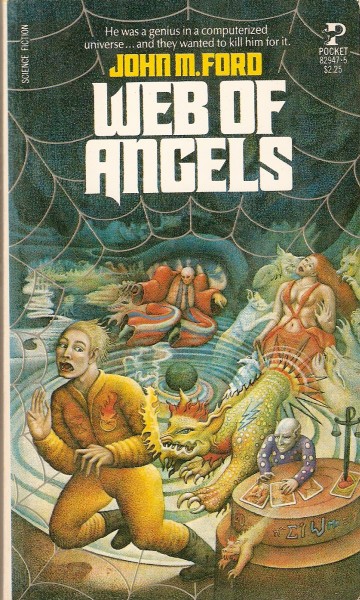 handed me a novel about a quest that, unknown to both of us, would set me off on a quest of my own. The book was called The Dragon Waiting, and it was written by the late science fiction and fantasy author John M. Ford. Helen placed the mass-market paperback with its garish cover in my hands, her eyes aglow with evangelical fervor, telling me I would love it. I would soon learn that, owing to Ford’s obscurity, his fans do things like this all the time. Soon, I would become one of them.
handed me a novel about a quest that, unknown to both of us, would set me off on a quest of my own. The book was called The Dragon Waiting, and it was written by the late science fiction and fantasy author John M. Ford. Helen placed the mass-market paperback with its garish cover in my hands, her eyes aglow with evangelical fervor, telling me I would love it. I would soon learn that, owing to Ford’s obscurity, his fans do things like this all the time. Soon, I would become one of them.
Writers (The Nerd Daily): In this sequel to For the Killing of Kings, Howard Andrew Jones returns to the ring-sworn champions of the Altenerai in Upon the Flight of the Queen to continue this thrilling, imaginative and immersive epic fantasy trilogy.
We had the pleasure of chatting to author Howard Andrew Jones about his upcoming fantasy sequel Upon the Flight of the Queen, which publishes on November 19th from St. Martin’s Press. Howard talks about what readers can expect and the challenges he faced, the inspiration behind the trilogy, what’s next for him, and more!
Genre Fiction (Dark Worlds Quarterly): There are those Fantasy writers and critics that accuse Robert E. Howard’s Conan of lacking any depth because he just hacks his way out of trouble. In fact, I think it was Robert Bloch in his intro to Wolfshead (Bantam Books, 1979) who said it, qualifying his words with the fact that he preferred Howard’s subtler characters such as Kull or Bran Mak Morn. I would hate to disagree with such a wonderful writer as Bob Bloch but I think he kinda missed the point. We want to see Conan hack his way out. Just as people pay gobs of money to be ringside at a boxing match.
Subculture (Amatopia): But if you show up humble and willing to learn, and don’t lie about knowing stuff about the subculture, you’ll find you have a whole bunch of cool new friends eager to help ease you in. At the very least, the people in the subculture will respect you, even if they may resent your intrusion. In time, you learn to be a part of the crew.
Fantasy (Matthew J. Constantine): The first novel in the Prydain Chronicles, 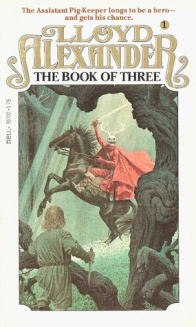 The Book of Three introduces us to Taran the assistant pig-keeper, Hen Wen the pig, Gurgi the…um…wildman?, and the rest, as well as the Welsh inspired land of Prydain. The book drips with a sort of gauze filtered, dreamy Fantasy in a similar vein to Tolkien’s Shire, particularly from The Hobbit. Reading the book, I kept thinking it would have fit as a comic strip in the tradition of Prince Valiant. It also has a lot that could translate well into an animated film or potentially a live action film these days.
The Book of Three introduces us to Taran the assistant pig-keeper, Hen Wen the pig, Gurgi the…um…wildman?, and the rest, as well as the Welsh inspired land of Prydain. The book drips with a sort of gauze filtered, dreamy Fantasy in a similar vein to Tolkien’s Shire, particularly from The Hobbit. Reading the book, I kept thinking it would have fit as a comic strip in the tradition of Prince Valiant. It also has a lot that could translate well into an animated film or potentially a live action film these days.
D&D (Skulls in the Stars): Die, Vecna, Die! (2000), by Bruce R. Cordell and 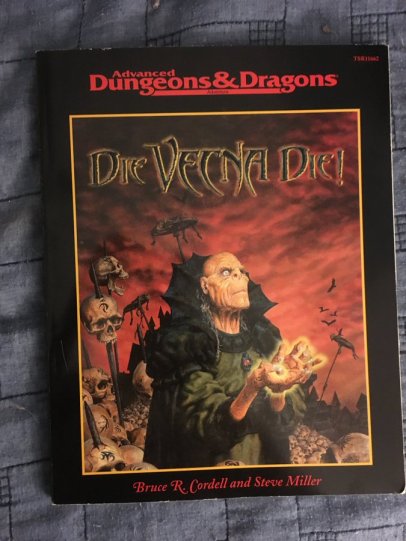 Steve Miller. This module has the curious distinction of being perhaps the last “old school” adventure ever published! Die, Vecna, Die! was one of two mind-bogglingly epic adventures released with universe-spanning ramifications, allowing DMs to have a reason for transitioning from 2nd edition AD&D to Wizards of the Coast 3rd edition D&D. The other is The Apocalypse Stone (2000).
Steve Miller. This module has the curious distinction of being perhaps the last “old school” adventure ever published! Die, Vecna, Die! was one of two mind-bogglingly epic adventures released with universe-spanning ramifications, allowing DMs to have a reason for transitioning from 2nd edition AD&D to Wizards of the Coast 3rd edition D&D. The other is The Apocalypse Stone (2000).
Fiction (DMR Books): Next week DMR Books will make our first foray into 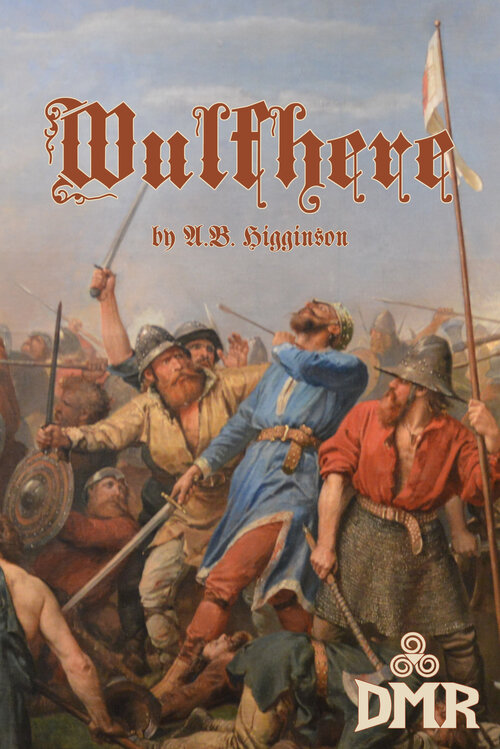 historical adventure fiction with the first book publication of Wulfhere by A.B. Higginson! Wulfhere, Higginson’s only novel, was originally serialized in Adventure magazine in 1920. In the Dark Ages of England, kingdoms were ready to be carved out by any with the ambition and might to do so. The mightiest ruler of all was Penda, Lord of Mercia, a man as strong as he was ruthless. He had no equal in martial prowess, except for his son Wulfhere…
historical adventure fiction with the first book publication of Wulfhere by A.B. Higginson! Wulfhere, Higginson’s only novel, was originally serialized in Adventure magazine in 1920. In the Dark Ages of England, kingdoms were ready to be carved out by any with the ambition and might to do so. The mightiest ruler of all was Penda, Lord of Mercia, a man as strong as he was ruthless. He had no equal in martial prowess, except for his son Wulfhere…
Tolkien (Alas Not Me): Crucial to the tale of Eärendil the Mariner is his ship,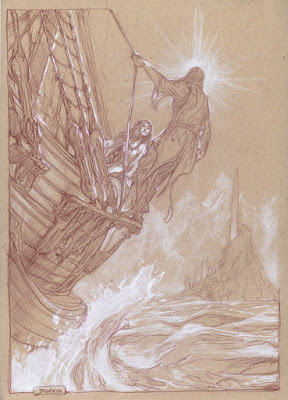 Vingelot or Vingelótë, without which Eärendil would have been stuck in a port on a western bay where lonely sailors pass the time away talking about their homes. The name Vingelot gives us a tantalizing and frustrating example of how very easily stories can be lost, likely forever.
Vingelot or Vingelótë, without which Eärendil would have been stuck in a port on a western bay where lonely sailors pass the time away talking about their homes. The name Vingelot gives us a tantalizing and frustrating example of how very easily stories can be lost, likely forever.
Writers (Mystery File): Over the course of his writing career, Clark Howard may have written over 200 short stories, not all of them criminous in nature, plus a couple dozen crime novels and collections. This does not include an unspecified number of works of true crime the editor of EQMM mentions in her introduction to this tale. Howard hardly ever used a character more than once, and “Blues in the Kabul Night” is no exception. When mercenary for hire Morgan Tenny smuggles himself into war-ravaged Kabul, the capital of Afghanistan, it is for a specific reason. His twin brother is in a high security prison there and scheduled for execution soon, unless Morgan can do something about it.
in nature, plus a couple dozen crime novels and collections. This does not include an unspecified number of works of true crime the editor of EQMM mentions in her introduction to this tale. Howard hardly ever used a character more than once, and “Blues in the Kabul Night” is no exception. When mercenary for hire Morgan Tenny smuggles himself into war-ravaged Kabul, the capital of Afghanistan, it is for a specific reason. His twin brother is in a high security prison there and scheduled for execution soon, unless Morgan can do something about it.
RPG (Brain Leakage): As I mentioned a few weeks back, I’ve been at work on an Appendix N inspired science fantasy series, one that envisions what D&D fiction might have looked like if it followed the wilder literary roots of the game, rather than filling in the map of TSR and WotC’s pre-fab fantasy worlds. And while I still plan on writing that, the fact is my recent thought experiments on what Fantasy Effing Vietnam would look like have gotten a bit more attention. To the point that I’ve gotten several messages in public and in private expressing interest in a published print version.
Calendars (Mens’s Pulp Mags): Now, with Eva’s permission, we’re offering a special collectible to go with the book: the Authorized 2020 Eva Lynd Calendar. It’s a limited edition calendar featuring photographs and artwork Eva modeled for, and it’s available exclusively from me on eBay. If you’re a regular reader of this blog, you probably know why Eva Lynd is so familiar to fans of the men’s adventure magazines (MAMs) published in the 1950s and 1960s.
special collectible to go with the book: the Authorized 2020 Eva Lynd Calendar. It’s a limited edition calendar featuring photographs and artwork Eva modeled for, and it’s available exclusively from me on eBay. If you’re a regular reader of this blog, you probably know why Eva Lynd is so familiar to fans of the men’s adventure magazines (MAMs) published in the 1950s and 1960s.
Fiction (Sacnoth’s Scriptorium): So, I’ve been trying for a long time to find an answer to the two questions: Did the Inklings ever read Lovecraft? And Did Lovecraft ever read the Inklings? So far as the first question goes, the answer is: still not proven. We know that Warnie Lewis was a fan of ‘scientifiction and read some of the pulp magazines like AMAZING STORIES. And THE NOTION CLUB PAPERS suggests that the Inklings were fairly conversant in science fiction. Certainly there are some echoes of Lovecraftian themes in Tolkien’s account of the Things beneath Moria, Lewis’s description of the subterranean world far beneath the surface of Venus, and especially Wms’ Cthulhesque octopoid-lords of P’o-l’u.
RPG (Walker’s Retreat): With last weekend’s Big Brand marketing event masquerading as a fan convention came the announcement–with no release date–of the fourth installment of its iconic isometric dark fantasy action RPG franchise. You know which one I’m talking about, and it’s not the MMORPG. I thought I’d take the time to give you all some alternatives that you may have overlooked or forgotten about, beside Path of Exile and adaptation of other Big Brand properties.
Art (Pulp International): Above, numerous Italian posters for 1960s and 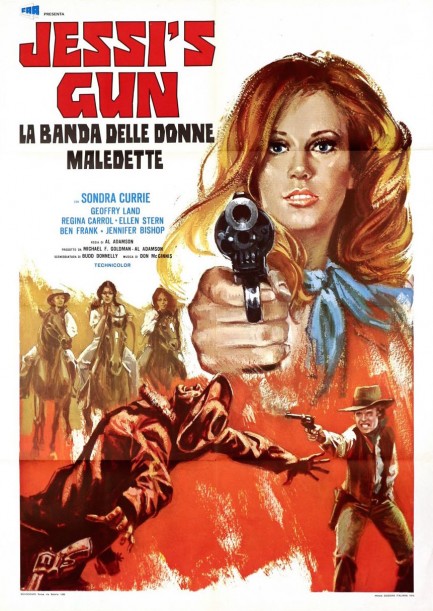 1970s westerns. Some of these movies were true spaghetti westerns (produced in Italy and shot in Europe, often Spain), while others are U.S. productions. All the imagery is beautiful. The artists responsible include Renato Casaro, Rodolfo Gasparri, Averardo Ciriello, Aller, aka Carlo Alessandrini, et al.
1970s westerns. Some of these movies were true spaghetti westerns (produced in Italy and shot in Europe, often Spain), while others are U.S. productions. All the imagery is beautiful. The artists responsible include Renato Casaro, Rodolfo Gasparri, Averardo Ciriello, Aller, aka Carlo Alessandrini, et al.
Review (Hillbilly Highways): I bought Congregations of the Dead over a 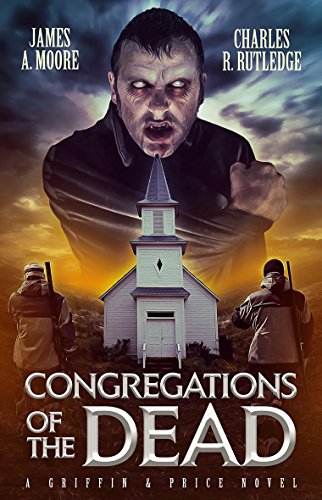 year ago on a bit of a lark because it was cheap. Which isn’t to sale that it didn’t sound right up my alley. A country noir/urban fantasy/horror mashup with significant pulp influences? (A secondary character is named Carter DeCamp in an obvious homage to Lin Carter and L. Sprague de Camp and Manly Wade Wellman’s characters Silver John and John Thunstone seem obvious influences as well.) What I didn’t realize is how damn good it would be.
year ago on a bit of a lark because it was cheap. Which isn’t to sale that it didn’t sound right up my alley. A country noir/urban fantasy/horror mashup with significant pulp influences? (A secondary character is named Carter DeCamp in an obvious homage to Lin Carter and L. Sprague de Camp and Manly Wade Wellman’s characters Silver John and John Thunstone seem obvious influences as well.) What I didn’t realize is how damn good it would be.
D&D (The Other Side): For today’s Monstrous Monday I want to do another 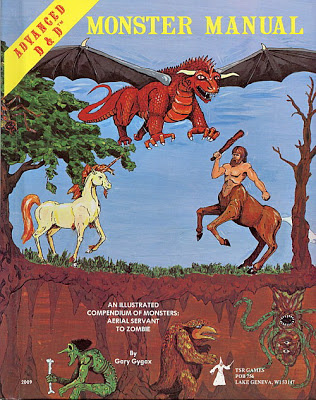 review. For this one, it still follows my ‘Back to Basic’ theme I have been doing all year even though it is not a Basic-era D&D book. It is though one of my Basic era books. The book is the Monster Manual and it was just about 40 years ago that I first held this book in my hand. This is the book. This is the book that got me into D&D and RPGs.
review. For this one, it still follows my ‘Back to Basic’ theme I have been doing all year even though it is not a Basic-era D&D book. It is though one of my Basic era books. The book is the Monster Manual and it was just about 40 years ago that I first held this book in my hand. This is the book. This is the book that got me into D&D and RPGs.
Warhammer (Warpscream): This book opens with a look at the bleak life of the average imperial citizen. Urinating in water recyclers on the arid world of Baal. It’s one of Guy Haley’s strengths is that he can paint such a despondent picture so rapidly to open with. The story briskly moves along as we are made aware of a dire threat to the world of the Blood Angels.
Writing (Frontier Partisans): I guess it triggered a memory of Robert E. Howard’s description of his own trip to the Carlsbad Caverns in the early 1930s. Howard is best known for his creation of the fantasy character Conan of Cimmeria — and he translated his experience in New Mexico directly into a Conan story. . . The power of the works of J.R.R. Tolkien derives in great part from his ability to evoke a landscape that is at once fantastical and real. Tolkien was profoundly affected by landscape — beloved and comfortable; awe-inspiring; terrifying and appalling.
Howard’s description of his own trip to the Carlsbad Caverns in the early 1930s. Howard is best known for his creation of the fantasy character Conan of Cimmeria — and he translated his experience in New Mexico directly into a Conan story. . . The power of the works of J.R.R. Tolkien derives in great part from his ability to evoke a landscape that is at once fantastical and real. Tolkien was profoundly affected by landscape — beloved and comfortable; awe-inspiring; terrifying and appalling.
Thanks for the shout-out and signal boost, Morgan. And great Sensor Sweep as always. Lots of good stuff to chew over.
This Sweep has a particularly fine batch of RPG-related links this week. Props!
That’s a good essay on poseurs and gatekeepers from Hellene.
I found the post about Earendil/Wade particularly interesting. Just the merest echoes from Anglo-Saxon times survived into our era. JRRT gathered them together and amplified them. A “signal boost”, indeed.